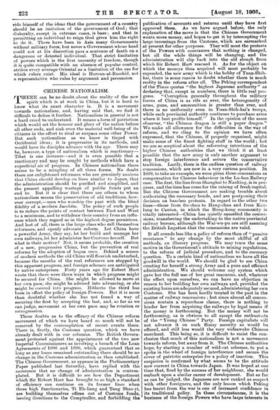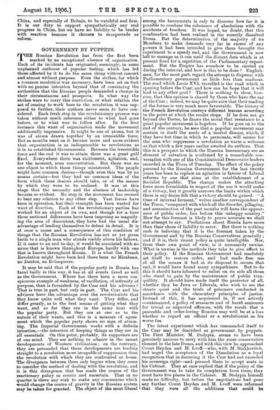CHINESE NATIONALISM. T HERE can be no doubt about the reality
of the new spirit which is at work in China, but it is hard to know what its exact character is. It is a movement towards nationalism, and, having said that, we find it difficult to define it further. Nationalism in general is not a hard creed to understand. It means aform of patriotism which would set the honour and glory of the nation before all other ends, and sink even the material well-being of its citizens in the effort to rival or surpass some other Power. But such nationalism as we know is tinged with Occidental ideas ; it is progressive in its methods, and would have its disciples advance with the age. There may be, however, a type of nationalism which is reactionary— Tibet is one instance—and it is even possible that a, reactionary end may be sought by methods which have a superficial air of progress. In Chinese nationalism there seems to be a mingling of all three forms. No doubt there are enlightened reformers who are genuinely anxious that China should develop on lines similar to Japan, that the administration should be purified and simplified, and the present appalling wastage of public funds put an end to. But it is clear that there are others to whom nationalism means the preservation of old traditions, how- ever corrupt,—men who worship the past with the blind fidelity of a. modern Jacobite. The policy of such people is to reduce the points of contact between East and West to a minimum, and to withdraw their country from an influ- ence which they regard as in the highest degree pernicious. And last of all, there is the large class who call themselves reformers, and openly advocate reform. Let China have a powerful Army, they say, let her build and manage her own railways, let her administer her Customs herself. But what is their motive ? Not, it seems probable, the creation of a new, progressive China, but the prevention of real reforms by the adoption of bogus ones. Behind a screen of modern methods the old China will flourish undisturbed, because the mouths of the real reformers are stopped by this apparent progress, and foreign schemes are anticipated by native enterprises. Forty years ago Sir Robert Hart wrote that there were three ways in which progress might be secured for China. She might be allowed to move at her own pace, she might be advised into advancing, or she might be coerced into progress. Hitherto the third has been in effect the policy of foreign Powers. But it is more than doubtful whether she has not found a way of securing the first by accepting the last, and, so far as we can judge, movement at her own pace may be rotation or retrogression.
These doubts as to the efficacy of the Chinese reform movement of which we have heard so much will not be removed by the contemplation of recent events there. There is, firstly, the Customs question, which we have already dealt with in our columns. 'The British Govern- ment protested against the appointment of the two new Imperial Commissioners as involving a breach of the Loan Agreements of 1896 and 1898, which guaranteed that so long as any loans remained outstanding there should be no change in the Customs administration as then established. The Chinese Government, as appears in the Parliamentary Paper published last Saturday, have replied with the assurance that no change of administration is contem- plated. But it is difficult to see how the Department which Sir Robert Hart has brought to so high a standard of efficiency can continue on its former lines when these high functionaries, Ti Eh-liang and Tang Shao-yi, are building themselves offices out of Customs funds, issuing directions to the Comptroller, and forbidding the publication of accounts and returns until they have first approved them. As we have argued before, the only explanation of the move is that the Chinese Government wants more money, and hopes to get it by intercepting the large incomings from the Customs, which are earmarked at present for other purposes. They will meet the protests of the Powers with assurances that nothing is changed, but all the while things will be changing, and the administration will slip back into the old slough from which Sir Robert Hart rescued it. As for the object on which the moneys thus acquired will most probably be expended, the new army which is the hobby of 'Yuan-Shih- kai, there is some reason to doubt whether there is much reality in the reform after all. The Peking correspondent of the Times quotes " the highest Japanese authority " as declaring that, except in numbers, there is little real pro- gress. " Corruption generally throughout the military forces of China is as rife as ever, the heterogeneity of arms, guns, and ammunition is greater than ever, and there is no uniformity even in Yuan-Shih-kai's troops, while each provincial authority continues to purchase arms where it best profits himself." In the opinion of the same observer, " the Chinese dragon is still a paper dragon." We make all allowance for the difficulties in the way of reform, and we cling to the opinion we have often expressed, that the Chinese, if properly organised, might make some of the finest fighting stuff in the world ; but we are so sceptical about the reforming intentions of the higher Chinese authorities that we think it at least possible that the new army is only another argument to stop foreign interference and secure the conservative tradition. Lastly, there is the endless question of railway concessions, which are now in a very curious position. In 1898, to take as example, we were given three concessions as compensation for Chinese behaviour in the Lu-han Railway case. The first, the line from Shanghai to Nanking, is in pro- gress, and the time has come for the raising of fresh capital. But the Chinese Government are making trouble about authorising the necessary bonds, and are postponing their decision on baseless pretexts. In regard to the other two lines—those from Su-chau to Hang-chau and from Kau- lung to Canton, in which the Hong-kong community is vitally interested—China has quietly cancelled the conces- sions, transferring the undertaking to the native provincial railway bureau, although the Wai-wu-pu are still assuring the British Legation that the concessions are valid.
It all sounds less like a policy of reform than of "passive resistance " to any change by the most skilful of all methods, an illusory progress. We may trace the same motive in the Government's attitude to mining regulations, to the reform of judicial procedure, and to the currency question. To a certain kind of nationalism we have all the goodwill in the world. We should be glad to see China creating for herself a strong Army and a pure and efficient administration. We should welcome any system which gave her the full use of her great resources, and, whatever the effect upon ourselves, we can have no objection in reason to her building her own railways and, provided the existing loans are adequately secured, administering her own Customs. She has been hardly treated in the past in the matter of railway concessions ; but since almost all conces- sions contain a repurchase clause, there is nothing to hinder her from acquiring the railways by legal means if the money is forthcoming. But the money will not be forthcoming, as is obvious to all except the enthusiasts of the "Young Chinese" Party. Foreign capitalists will not advance it on such flimsy security as would be offered, and still less would the very wideawake Chinese merchant. This being so, it is difficult to resist the con- clusion that much of this nationalism is not a movement towards reform, but away from it. The Chinese authorities hope, by starting a number of wild-cat schemes, to put a spoke in the wheel of foreign interference and secure the cover of patriotic enterprise for a policy of inaction. This suspicion is confirmed by what seems to be the attitude now current in China towards Japan. It was hoped at one time that, fired by the success of her neighbour, she would embark upon a similar career of development. But so far as can be judged, the Japanese are now ranked as suspect with other foreigners, and the only lesson which Peking has learnt from the war is one of increased confidence in its traditional policy. In these circumstances, it is the business of the foreign Powers who have large interests in China, and especially of Britain, to be watchful and firm. It is our duty to support sympathetically any real progress in China, but we have no liability to be tender with reaction because it chooses to masquerade as reform.



































 Previous page
Previous page